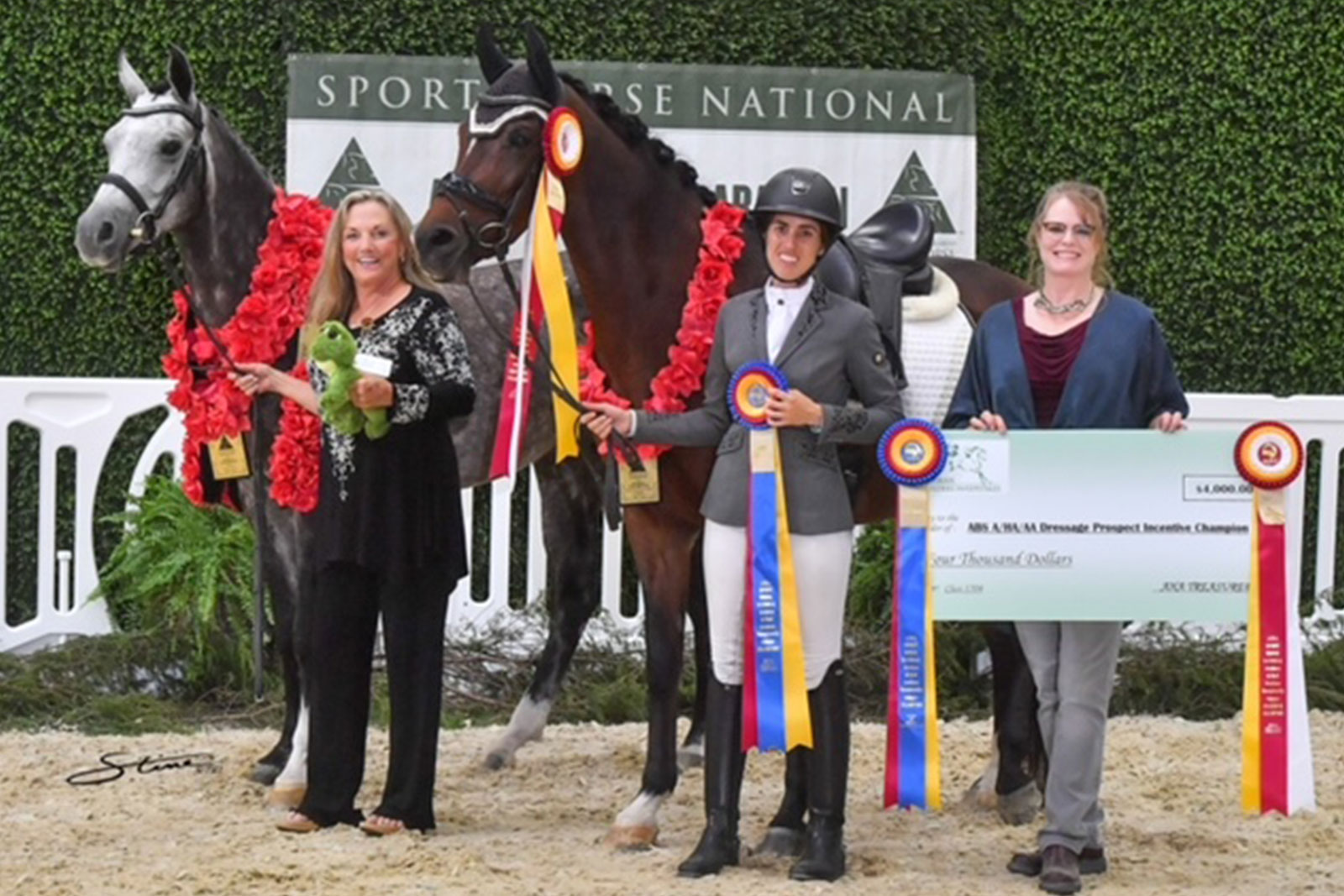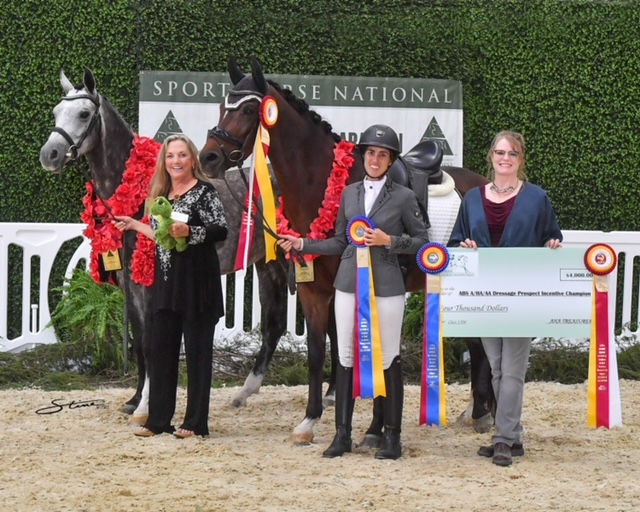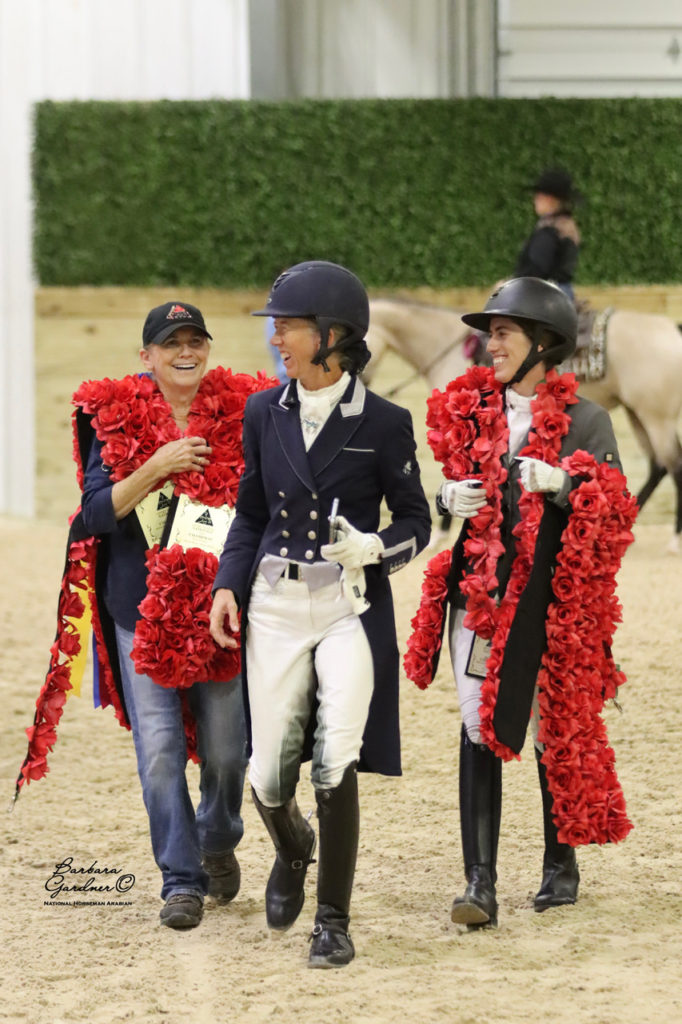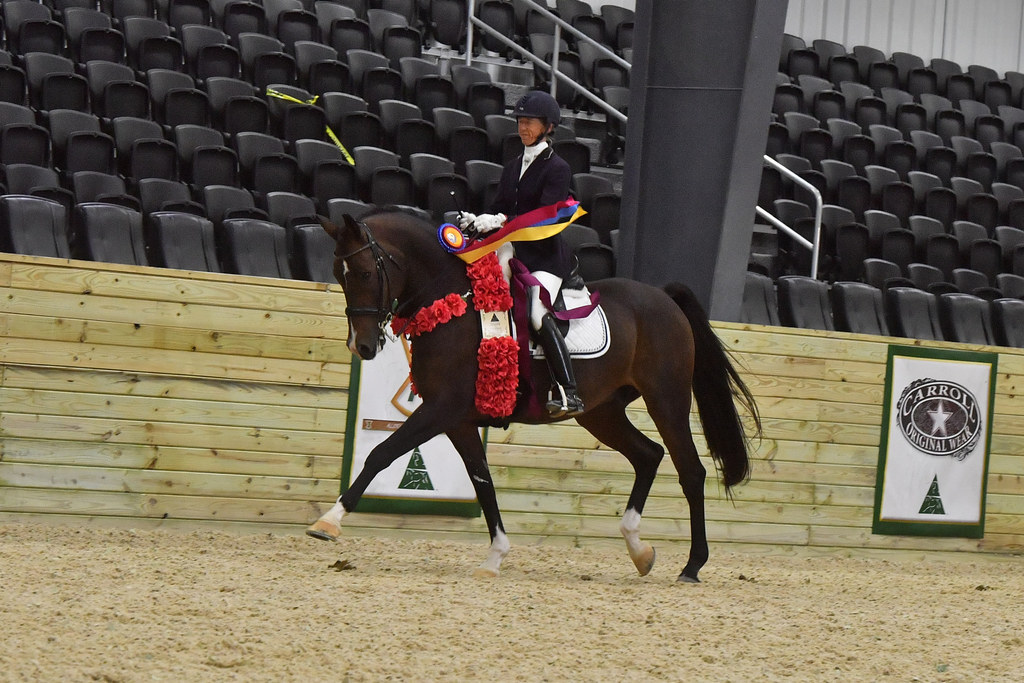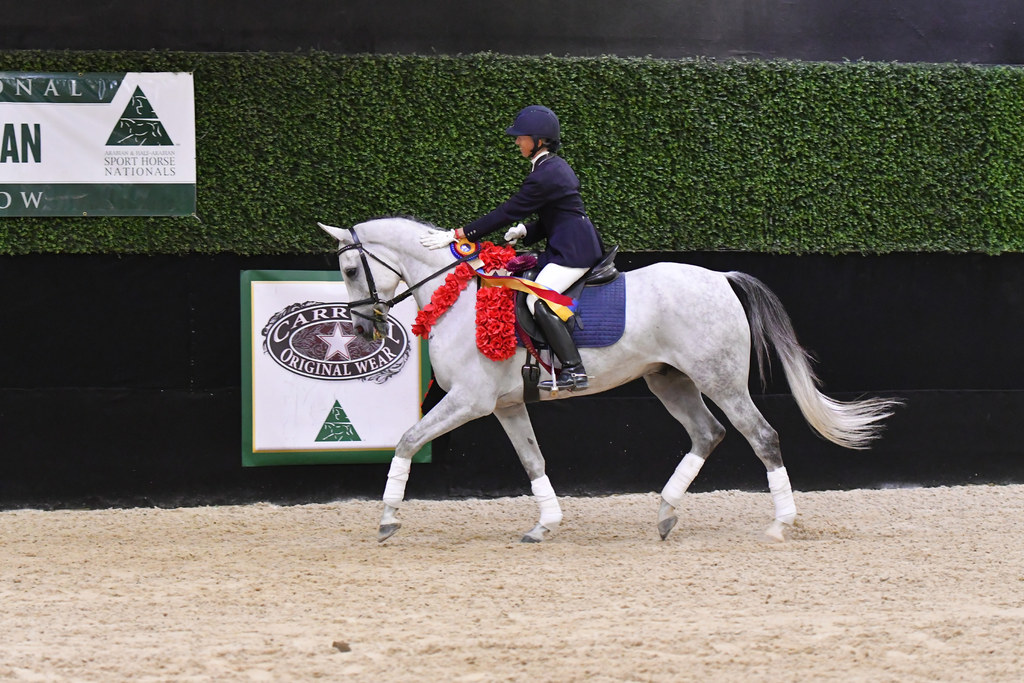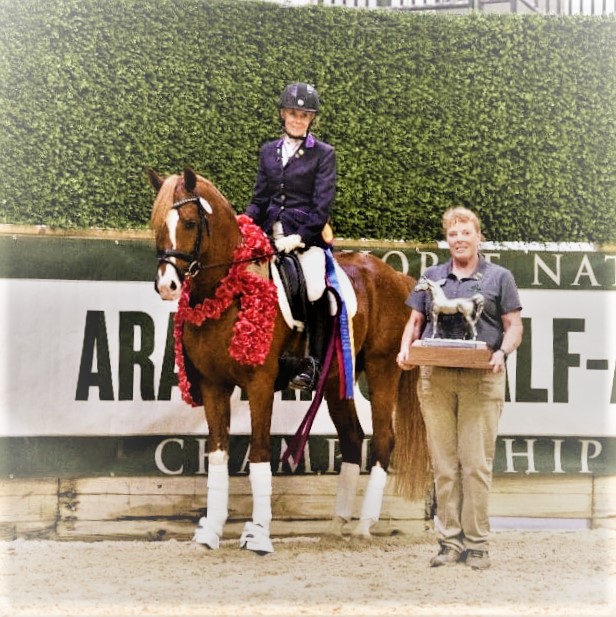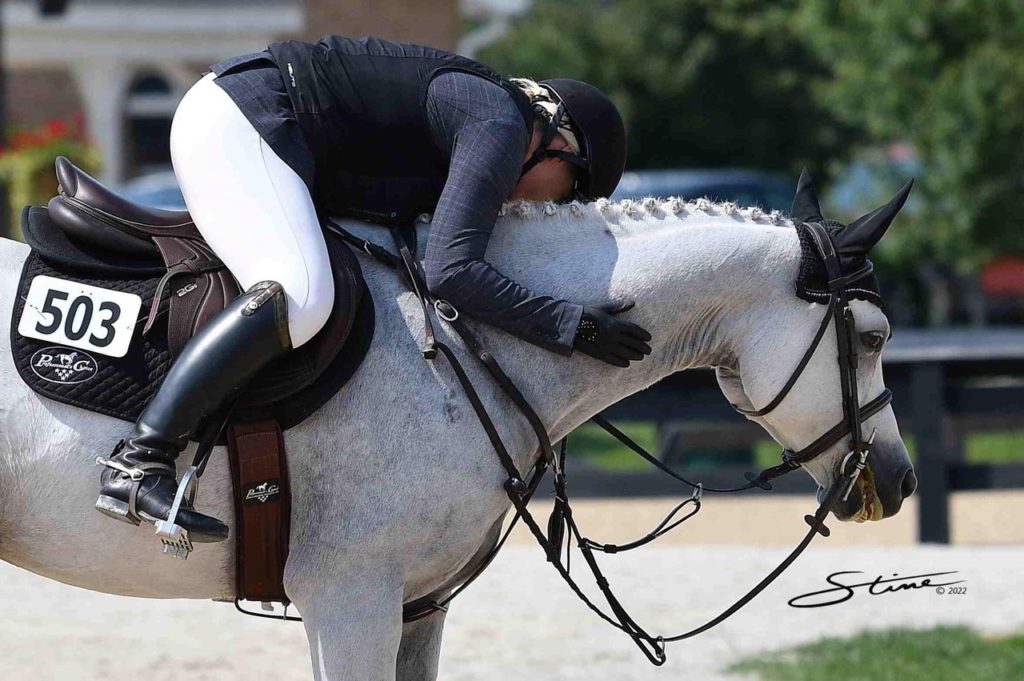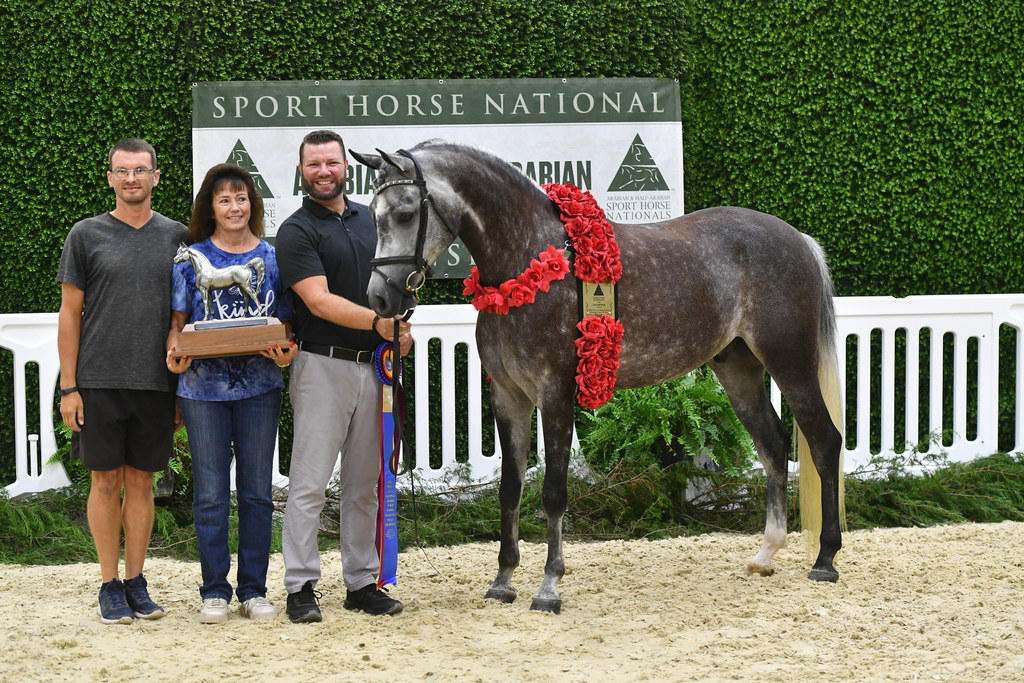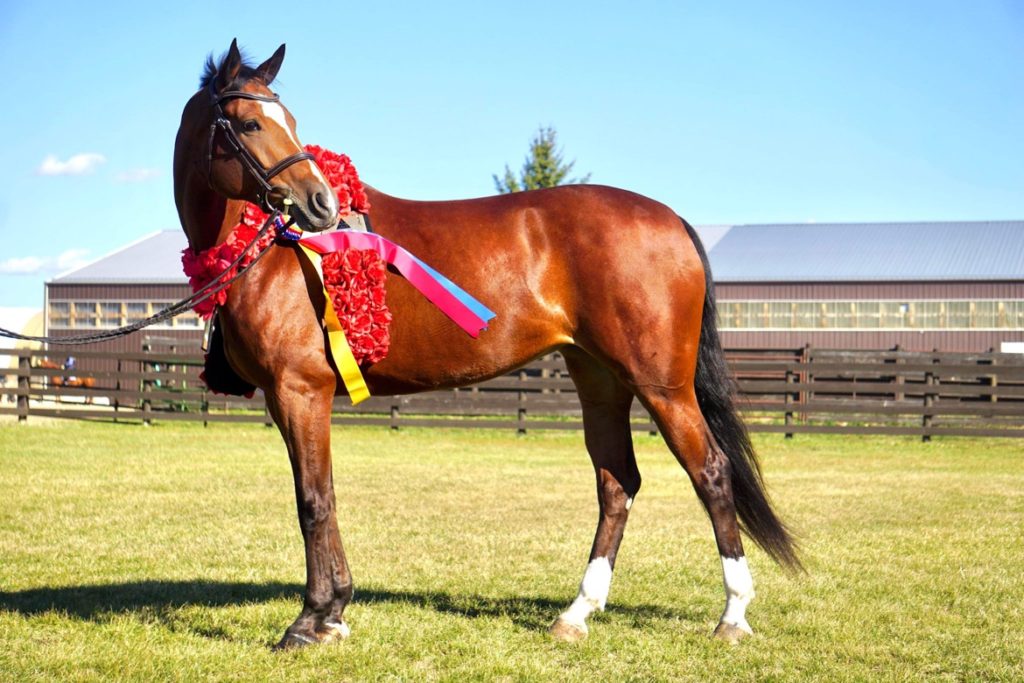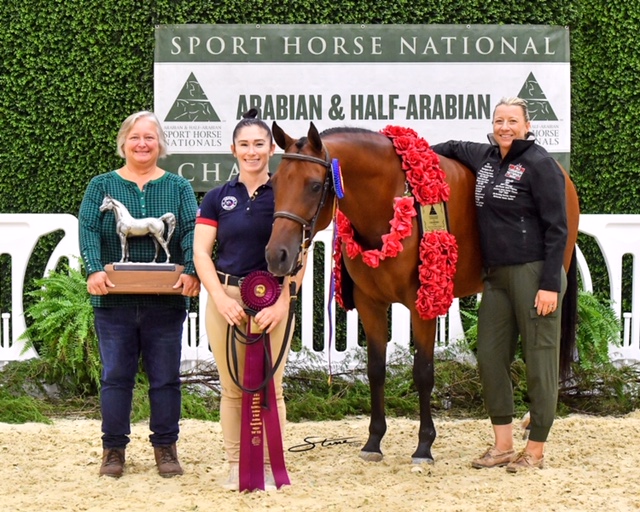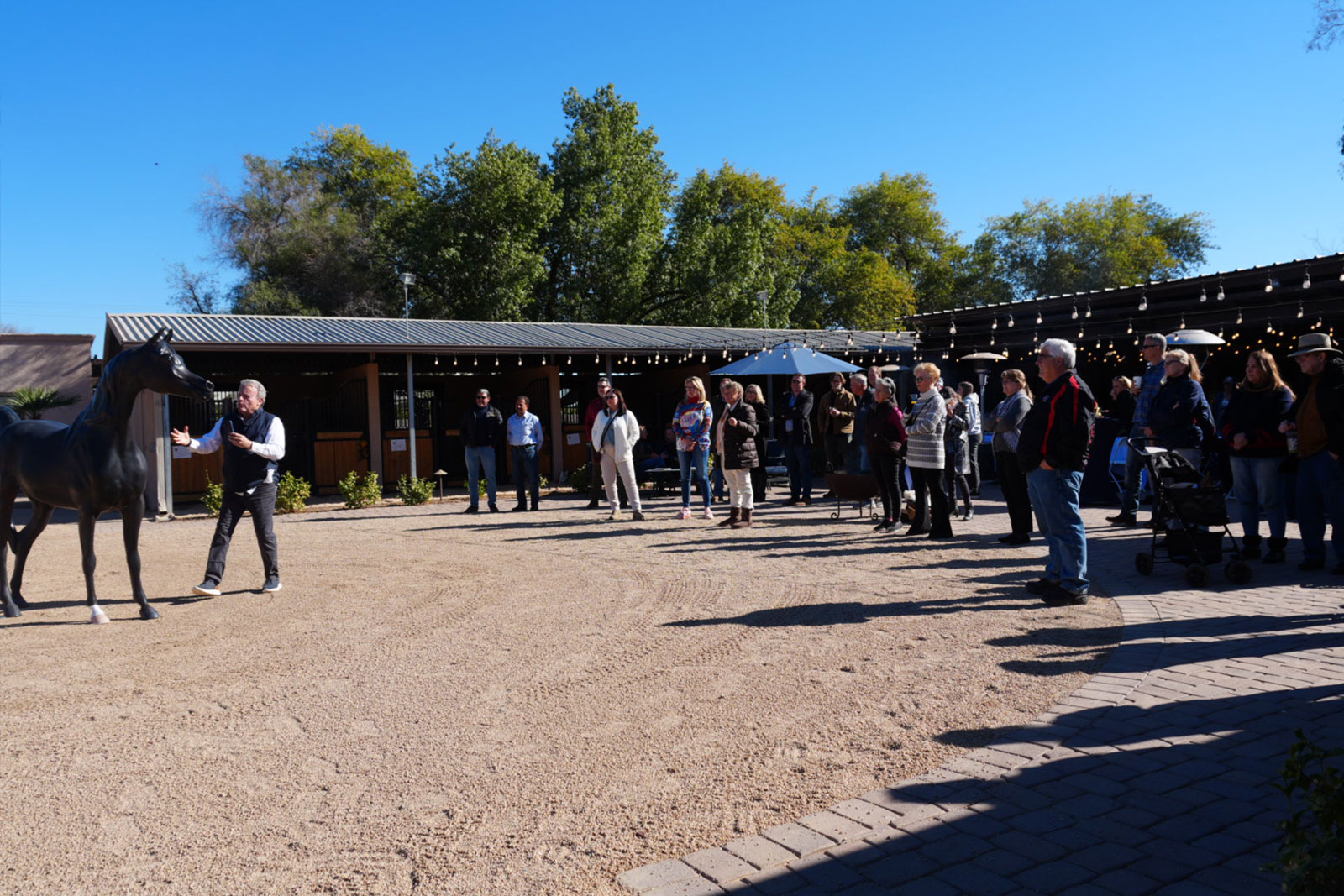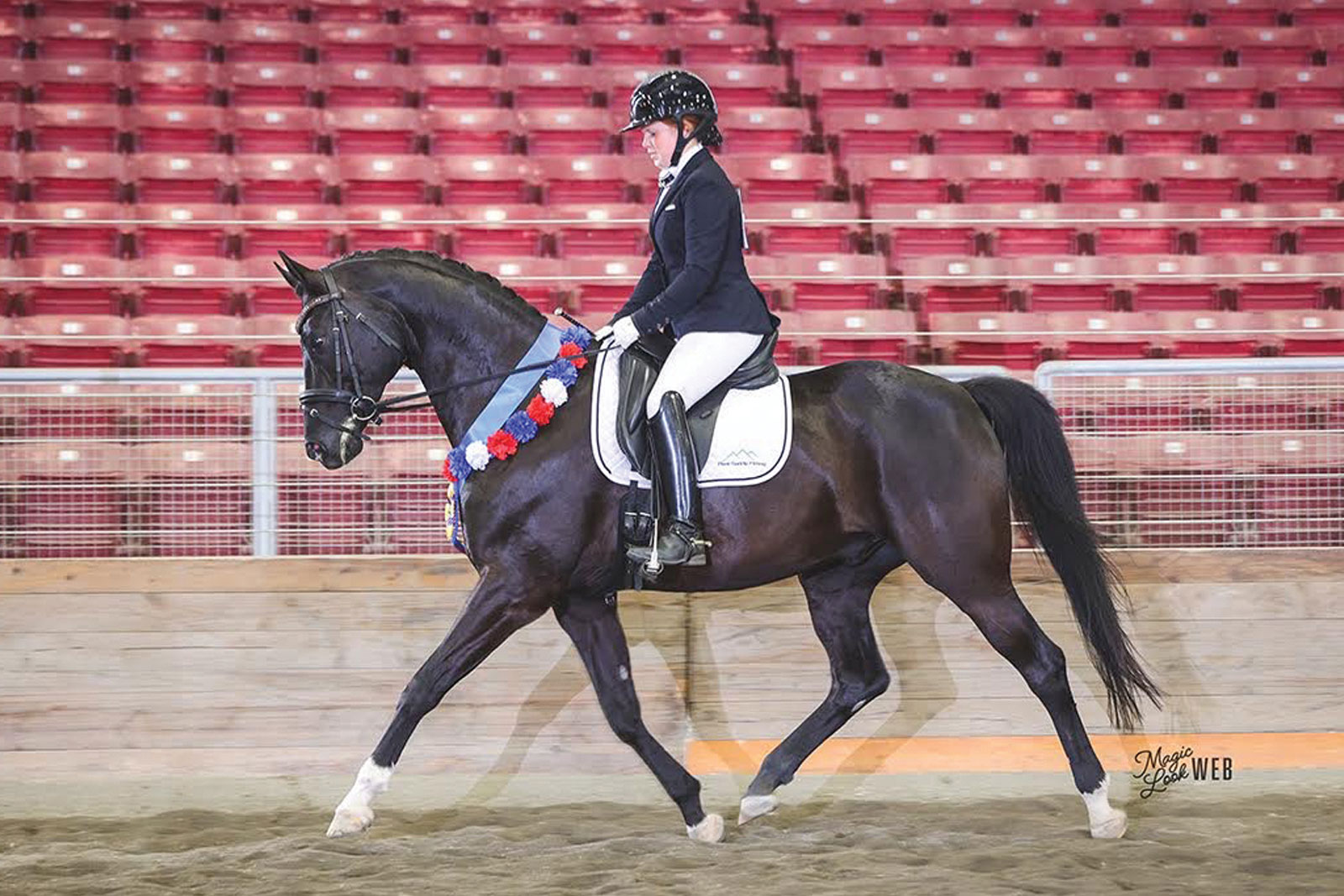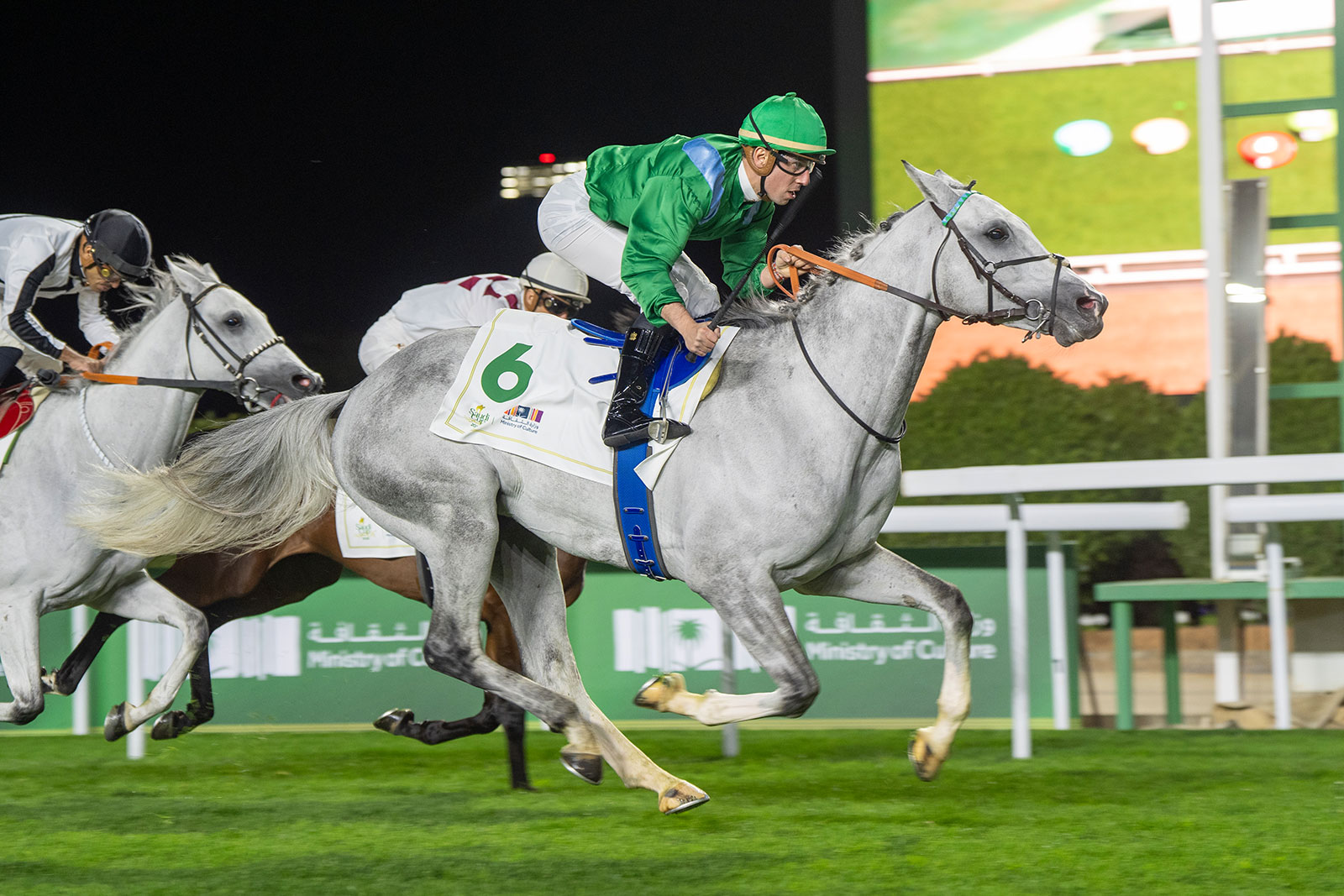Champion Dressage Training Level Junior Horse, Champion ABS Dressage Prospect Incentive, and Reserve Champion Hunter Hack Junior Horse Syriusly Celestial LD (Celestin x Syriana VS), owner and breeder Mary Anne Morrison, Reserve Champion Dressage Third Level Miss Congeniality LD (Con Caletto x Swan Song DDA) and rider Hannah Finch.
“Honor rounds without the horses — we decided to wear some of our roses to the dressage honor rounds,” says Amy Miller. “Both our horses had classes that evening, so Jan Roeder, me and Hannah Finch participated in the dressage honor rounds on foot. We had a fabulous time, all dressed in roses, and being entirely too joyful and ridiculous. But, sometimes, the moment is so special, so happy and we just had to let some of the happiness out.”
Champion Grand Prix Dressage, Champion Dressage Intermediate II, Champion Half-Arabian Show Hack and Half-Arabian Under Saddle Dressage Type Aristocrat CD (Aleros x Leonora), owned by Jan Roeder, Santa Ana, California, and ridden by Amy Miller.
National Champion Half-Arabian Dressage Training Level and Champion Half-Arabian Dressage First Level Kishmir MFA (UB40 x Thee Ariella), owned by Andreas Klohnen and Katherine Ellis, Chino Hills, California, and ridden by Amy Miller.
Reserve Champion Dressage Second Level, Reserve Champion In-hand Stallion Hunter Type and Reserve Champion In-hand Stallion Dressage Type ATH Reverberation (Enlightened x HVS Electricity), owned by Cathi O’Neill, Aptos, California, and ridden by Patience Prine.
Champion Beginner Novice Combined Test GG Power and Fame (*Sir Fames HBV x Powerraid Dawning Sun), owned by Debbie Glasener, Samantha Kaffenberger and Kassie Hobbs, and ridden by Noelle Roberts.
National Champion In-hand Gelding Dressage Type and National Reserve Champion In-hand Gelding Dressage Type ATH Smokin Thyme ABA (Mirage V x Essence Of Thyme ABA), owned by Barb Suvaka, Absolutely Arabians, Caledonia, Wisconsin, shown by David Conner and Miller Pinson.
Champion Half-Arabian In-Hand Mares Hunter Type ATH and Reserve Champion Dressage First Level ATR Ailanda (Lando x Majestk Europa), owned and shown by Kristen Richie.
Champion Mare In-hand Hunter Type, and Reserve Champion Under Saddle Hunter Type Empreska (Empres x Sandomierza), owned by Noelle Roberts and Debbie Glasener, Ramona, California, and shown by Shannon McCormick.
This year’s U.S. Sport Horse Nationals was the 19th since its inception in 2003, when 402 horses made the trip to Lexington, Virginia. At that time, as AHW reported in the January 2004 issue, the show chair, Ed Peterson of Hidden Hollow Arabians, believed in the viability of a separate national showcase for Arabian sport horses, and fought for the opportunity to prove his case. As he said, “The turnout was fantastic – we had more horses than we anticipated. From the start I’d hoped to attract people who had left, or never joined, AHA, and with 25 percent of our entries coming from the open show circuit, we made great inroads in accomplishing that.” He added that the sport horse classes are truly a level playing field with so many individual works. “All of our judges come from the open circuits and we’re going to keep it that way.”
After nearly 20 years, this year’s U.S. Sport Horse Nationals show drew 535 horses from 41 states and 2 foreign countries, with 2,582 class entries. The World Equestrian Center in Ohio got rave reviews from the sport horse crowd – they could not say enough great things about the facility’s layout, arenas, footing, stalls, and staff. And, of course, the stellar quality of the Arabians competing in the Sport divisions.
But there was one issue that seemed to be on everyone’s minds: a Resolution that is up for a vote at this year’s AHA Convention, R 5-22, which proposes to allow Arabian judges with a Sport Horse Specialty card to officiate Sport Horse In-Hand and Sport Horse Under Saddle classes. On the following pages we are sharing the thoughts of trainers, breeders and owners in the Sport Horse world on this topic. They all happen to be opposed to the resolution. We did reach out to some folks who are in favor of the resolution, but they did not wish to be quoted. As always, the door is open to all sides.
Hannah Finch
HF Sport Horses | Ventura, California
To what do you attribute the tremendous growth in the Arabian Sport Horse realm?
The growth in the Sport Horse realm has a great deal to do with the fact that the sport horse disciplines are often more easily accessible to the average owner and rider. Many areas of the country have a strong network of hunter/jumper or dressage trainers as well as multiple show circuits with multiple shows per month and multiple levels of competition. The Arabian horse is incredibly versatile and there really is something for everyone in the Sport Horse world. I believe that Arabian and Arabian crosses are more widely accepted on these show circuits, even at the higher levels. At my barn we split our show season between open and breed shows and have loved showing how competitive our horses can be. This exposure leads to more people becoming interested in the breed and hopefully getting their own Arabian horses. The sport horse disciplines also seem to lend themselves to amateur owners who want to be a bit more self-sufficient and do most of the riding and training of their horses themselves.
We would like to know your thoughts on Resolution 5-22 which proposes to allow Arabian judges with a Sport Horse Specialty card to officiate SHIH and SHUS classes. What are your thoughts on this issue? A good idea or not?
I am against the passing of this resolution because I would prefer to have myself and my horses judged by judges who hold their judge’s cards in the disciplines that are most closely related to the horses that they’re judging. It seems that most competitors use these classes at smaller shows to gauge how we hope our horses will do at larger shows and Nationals, so I’d be concerned that using judges who hadn’t gone through the standard programs to get their hunter/jumper or dressage cards would not give these competitors an accurate idea of their horse’s chances. It makes sense that a dressage judge who sees dressage horses at most shows may have an easier time judging a class of them than a judge who specializes in Main Ring disciplines and judges a SHUS or SHIH class once or twice a year.
In what ways do the Sport Horse In-Hand and Sport Horse Under Saddle differ from their main ring counterparts?
The main difference is that I see SHIH and SHUS as addition and stepping stones to the main disciplines my horses do rather than it being their main “job,” as the equivalent classes seem to be for main ring horses. For example, with one of my horses I’ve added on Sport Horse Show Hack only now that she’s climbing the higher levels in dressage and truly starting to understand collection and extension which is necessary in that class. My horses’ main jobs are not the rail or in-hand classes, those are more extra credit assignments that we get to add on. I do love the SHIH classes for young horses as a stress-free way to get them comfortable at shows and in the showring.
Is there a need for any other Resolutions pertaining to the Arabian Sport horse?
There’s always improvements but I am thrilled with the huge growth in the Sport Horse world and it makes me very hopeful for the longevity of the breed and sport! I do think that it would be helpful to split SHUS and SHIH classes by type whenever possible at shows to make it as fair as possible to all of our competitors.
Amy Miller
Trainer at Will Mar Arabians | Chino Hills, California
To what do you attribute the tremendous growth in the Arabian Sport Horse realm?
We had an incredible show, winning each of the six classes we entered. I never imagined that could actually happen. I hoped, of course. I planned, we worked, we strategized. But horse showing — it has its own weird sense of luck and timing. Just somehow it all came together for that magical week in Ohio. Never to be forgotten and always to be celebrated.
I attribute the tremendous growth in the Sport Horse disciplines to the versatility of the Arabian horse as well as the increased opportunity for competition. Competing in the Sport Horse disciplines allows exhibitors to compete at the Arabian shows as well as the “open” shows. I compete with Arabians, Half-Arabians and Warmbloods at USDF shows. As a competitor, I appreciate being able to take all of my horses to a single show, receive feedback on our training in the form of our test sheet, and then having clear training plans and goals to accomplish before our next competition. I think exhibitors value this individualized feedback as it helps provide understanding and guidance during the competition experience.
We would like to know your thoughts on Resolution 5-22 which proposes to allow Arabian judges with a Sport Horse Specialty card to officiate SHIH and SHUS classes. What are your thoughts on this issue? A good idea or not?
I understand the frustration of show management regarding the hiring of a specific judge for the SHIH and SHUS. The show then must decide whether to pass the added cost on to the sport horse exhibitors, or to take a loss while providing increased class options at the show. I understand the desire to provide the classes while maintaining fiscal responsibility for their club. I have already experienced this at several Arabian shows. A USEF show steward can officiate for dressage tests through Fourth Level. Offering the International tests (FEI tests, Prix St. George, Intermediate I, Intermediate II, and Grand Prix) requires a USDF Technical Delegate to be present. This then requires the hiring of an additional licensed official. Most shows decide to limit their class schedule to Fourth Level and below to avoid this extra expense for one or two competitors. I appreciate the show management’s perspective. Allowing an Arabian judge with a Sport Horse Specialty card to officiate SHIH and SHUS classes does simplify this situation, and allow competitors exposure to the sport horse disciplines.
Unfortunately, I can’t support the decision of a Sport Horse specialty card for many reasons. Aside from the overdone comparison of asking a podiatrist, who is a licensed physician, to perform heart surgery (a significantly different specialty), I feel that changing the judging requirements to a Sport Horse specialty card would begin to shift the horses rewarded in those classes. I have also heard the argument of allowing this specialty card only at specific shows. I compete at several different venues during the year in preparation for USDF regional championships and Sport Horse National Championships. At times, we receive overly generous scores from judges. While I always enjoy the gift, it can be confusing for competitors to receive greater scores at some shows, and then a strict reality-check score at the championships. While the generous gift boosts spirits at the time, in the long term, it does a disservice to the competitor, providing a false sense of competency in their skill set. I worry that riders winning classes under judges with a Sport Horse Specialty card would then suffer a severe reality when showing under judges licensed and officiating in the open sport horse world. To me, the purpose of the Sport Horse classes is to provide an area to compete against your own breed with the same standards as the open world. What other breed can fill six days of National Championship competition with just their own breed? It would be a shame to shift away from that quality.
In what ways do the Sport Horse In-Hand and Sport Horse Under Saddle differ from their main ring counterparts?
I think people can develop tunnel vision, and forget to consider the benefits that other divisions can offer. We generally compete at the Scottsdale Arabian show each year. I love that show! I watch as many different disciplines as I can, soaking in all of the different attributes. I warmed up in the Wendell warm-up arena last year. Watching the English pleasure riders reminded me to sit back and stop creeping ahead of the vertical. How can I ask my horse to complete 15 flying changes every stride when I am burdening his forehand? I watched the reining horses run full speed, and slide to a stop with the barest touch of the bridle. Maybe I could find a little more self-carriage during the extended trot to the passage transition. I watched the walk-trot riders, so serious but also so full of glee to be riding at the big show. Maybe I could remember how to find that joy again, and remember how much I love riding and partnering with my horses.
Is there a need for any other Resolutions pertaining to the Arabian Sport horse?
I would love to see any resolutions that provide competitors with as many options as possible to fulfill qualification requirements. As mentioned above, I often compete at open USDF shows because the Arabian shows aren’t able to offer the FEI Grand Prix test. This then requires me to also show at an Arabian show to fulfill the Sport Horse Under Saddle and Sport Horse Show Hack qualification requirements. I would support any resolutions that consider different avenues to complete those qualification requirements. For example, a horse could qualify for Sport Horse Under Saddle Dressage Type by completing dressage tests at a USDF rated show.
Mary Anne Morrison
Laughing Dog Ranch LLC. | Ojai, California
To what do you attribute the tremendous growth in the Arabian Sport Horse realm?
It’s my observation that Sport Horse is growing as owners/riders seek a more active role in the development of their horses. Trainers are viewed as coaches whose goal it is to enhance the relationship between horse and rider over a lifetime.
We would like to know your thoughts on Resolution 5-22, which proposes to allow Arabian judges with a Sport Horse Specialty card to officiate SHIH and SHUS classes. What are your thoughts on this issue? A good idea or not? In what ways do the Sport Horse In-hand and Sport Horse Under Saddle differ from their main ring counterparts?
The purpose of SHIH and SHUS (and Dressage Prospect) classes is to determine suitability of the horse for a specific performance discipline. Hence, conformation also includes expression, manners, willingness, balance and harmony. Transmissible weakness/unsoundness is to be penalized commensurate with severity. In other words, function as a riding horse is the priority!
In Main Ring, form is emphasized over function. For example the lovely flat croup would be scored quite differently between the Main Ring and the Sport Horse ring!
Likewise, although I’m a sucker for a beautiful head/neck, you “can’t ride a head!”
For this, and many other reasons, I must side with the Sport Horse contingent who strongly urge AHA to require judges to have competed in Dressage and/or Hunter/Jumper at higher levels before adjudicating it. We want our standards to be compatible with that of the Open Rings! Dressage judges carefully critique each ride in writing — this helps rider, hors DC league of super-petse and trainer to progressively improve. Hence, the judge must have a deep understanding of what it takes to get to the next level.
When I first showed (and won National Champion Half-Arabian SHIH Breeders Sweepstakes) with Lil Miss Perfect LD (Goldhills Most Wanted x Aiming For Perfection) in 2012, Sport Horse Nationals was still considered the “red-headed stepchild” and/or the “repository for failed Main Ring Performance horses.”
Times have changed! We now have savvy owners/breeders/trainers who demand very high-quality performance animals. As mentioned, we have reason to expect our Arabs and crosses to be competitive on the open circuit. We need our judges to expect the same! As we excel, exposure brings new folks; those who previously whispered, “them crazy A-Rabs,” are now shopping for one!
Jim Porcher
Arabian Sport Horse Nationals Commission Chair | Los Ranchos, New Mexico
“I am the Chair of the Sport Horse National Commission and I attended the show. The show had 602 horses in 2021 and 535 this year. SHN 2022 averaged 4.81 classes per horse. We had horses from 41 states and 2 from a foreign country.
To what do you attribute the tremendous growth in the Arabian Sport Horse realm?
The answer to that is multi-faceted and there is no one reason. The Arabian was the original “sport horse” and they were imported from the desert by Westerners to breed to the native mares to produce offspring that were more agile and to add endurance and intelligence for both war and sport. We can define sport today as racing, dressage, and jumping and we have people who are attracted to those disciplines but want to participate with an Arabian or Arabian cross. We also have people who have always loved Arabians and have found they are most comfortable competing where there is a scorecard and they are evaluated by experts in those disciplines. Dressage and SHIH both have scorecards that will be returned to the exhibitor so they can see where they need to improve. The Hunters are also marked on a scorecard and are given a numerical score. Those aren’t posted but they are available for review by an exhibitor if they ask. I believe the growth in the Arabian Sport Horse parallels the growth we see outside of the breed but within those disciplines, and it is because people want a connection with their horses as they both progress along the journey. The Arabian Sport Horse world offers that.
We would like to know your thoughts on Resolution 5-22 which proposes to allow Arabian judges with a Sport Horse Specialty card to officiate SHIH and SHUS classes. What are your thoughts on this issue? A good idea or not?
I am opposed to the proposed resolution because the original concept of the Sport Horse Committee was to use experts in the disciplines that comprise Sport Horse: dressage, hunter/jumper, and carriage and that those experts would give us an unbiased evaluation of how we were doing. That protocol has worked quite well for us. There have been a few hiccups along the way, but they are minor in the big picture. Not only has the Arabian Sport Horse benefited from the expertise of the experts, we also have exposed them to the unique characteristics and positives of our breed, which they have taken back to the open world. At the most recent SHN, the two Hunter judges were most complimentary of our horses and said there were many they would like to ride and that several of them could easily show on the open circuit. These are judges who do 30 shows a year all over the country, so it was a big compliment. While I have a great deal of respect for our Arabian judges — I am one myself — and I feel they could “tie” a SHUS class correctly, they are still not qualified under the guidelines set out by USEF to officiate in these classes. We would welcome any Arabian judge with open arms if they went through the steps to obtain the proper credentials (and the handful who do hold multiple cards are in high demand). I understand the reasoning of the struggling shows and the expense of hiring multiple judges but SHIH and SHUS classes are not “halter light” or “hunter pleasure light.” There are suitability and support classes for the disciplines mentioned and the Arabian Sport Horse exhibitors/breeders feel they should be evaluated by the experts in those disciplines as was originally intended.
In what ways do the SHIH, and SHUS differ from their main ring counterparts?
SHIH and SHUS are discipline based and Main Ring classes are breed based. The SHIH and SHUS are being judged on their suitability to be Dressage, Hunter/Jumper or Carriage horses. Form to function and movement are key factors in that evaluation. The judges will rely on their expertise in the disciplines they are carded in to select horses that will be successful in the other high-performance Sport Horse disciplines. While SHIH and SHUS were developed specifically by the Arabian Sport Horse Committee, there are no real “counterparts” in the main ring. These classes are unique.
Is there a need for any other Resolutions pertaining to the Arabian Sport horse?
The different committees related to Sport Horse are very good about addressing all the needs for the related disciplines. If there are resolutions pertaining to the Arabian Sport Horse, then those resolutions should come from various SH committees and be vetted there before moving on to the general population. The Arabian Sport Horse Nationals was hatched in committee and that process has served it well over its 20-year history. Let the destiny of those horses be determined by those involved with the disciplines that make up Arabian Sport Horses.
Patience Prine
Training with Patience | Moss Landing, California.
We had a good Sport Horse Nationals but no Championships. However, Reverberation (Enlightened x HVS Electricity) did win three Reserve Championships – two in Sport Horse In-hand Dressage Type Stallions and one in 2nd Level Dressage. All the others were Top Ten with high placings and good scores.
To what do you attribute the tremendous growth in the Arabian Sport Horse realm?
It is very amateur friendly and gives everyone a place to start whether low or green hunters or training level dressage, and there’s always a place to move up the levels. As a professional I love the way we can move a horse up the levels with their education; we aren’t stuck in one class going in circles. Arabians seem to enjoy doing more and learning new things. Plus there is under saddle and in-hand, and it is all judged by Open USEF or USDF judges who are educated in the sport discipline.
We would like to know your thoughts on Resolution 5-22 which proposes to allow Arabian judges with a Sport Horse Specialty card to officiate SHIH and SHUS classes. What are your thoughts on this issue? A good idea or not?
Nope, not a good idea. I feel it will go the way of hunter pleasure and show hack, which are now completely different classes from when they started out. If an AHA judge wants to judge sport horse, I suggest they go through the same education that the hunter or dressage judges do.
I know this has caused a lot of hard feelings with some people but it’s really all about education. I have no problem if an AHA judge wants to get the education and go through the judging process to become a sport horse judge…but a one or three-day seminar for a specialty card isn’t going to be enough.
In what ways do the SHIH, and SHUS differ from their main ring counterparts?
SHUS would be analogous to hunter pleasure in the main ring, where the horses are judged more in a frame and up and down movement with excessive shoeing to cause unnatural movement. The horses are tighter and quicker in movement. The sport horses are more natural and relaxed, working from the hind end over the back and through to be on the bit. They like to see more swing in the back and length of stride.
SHIH is also shown in a relaxed stance rather then the hard standup of the main ring. Movement is the key, with a relaxed walk — they want to see a big overstep and swing through the back, same with the trot, with elasticity. In main ring halter it is more about type and standup, with a lot more animation. Very different classes and the way they are judged is very different.
Is there a need for any other Resolutions pertaining to the Arabian Sport horse?
I would like to see horses in SHUS and SHIH have to show or qualify in at least one working class. For instance the hunter type SHIH horse can do hunter hack or low hunters, etc. Same with the dressage type, where a horse needs to show at least the training level. If a horse can walk, trot, canter around an arena, they can do training level dressage.
Noelle Roberts
Delacreme Equestrian | Murrieta, California
“We had a fantastic Sport Horse Nationals this year. I’ve always enjoyed competing at SHN, but this year I thoroughly enjoyed coaching. I always take students of my own, but I have the pleasure of also being asked to coach other professionals and amateurs alike. Hannah Finch and I have been working together a few years and this year I had some new students from Canada that asked for my help since their coaches couldn’t make the trip down. I enjoy the challenge of stepping in and doing my best to not reinvent the wheel, but help guide those riders to successful rides in the ring. And man… when that works out, that’s as good as winning roses for me.”
To what do you attribute the tremendous growth in the Arabian Sport Horse realm?
I think what draws exhibitors to the Sport Horse disciplines is accessibility, dependability and camaraderie.
The Sport Horse disciplines have something for every level of rider and there’s an obvious ladder system. If you’re an amateur who likes to jump, but never wants to jump bigger than 2’6,” you can stick to the 2’ working hunters and the hunter hacks. If you love dressage, but don’t have a horse with upper level movement, you can be successful at the lower levels. And if you want to jump 3’ or show at the FEI level dressage, you can do that too! You have to be a good student to be successful at Sport Horse, but you don’t have to be sitting on an expensive mount or be in a full training program. You can be a dedicated amateur who brings along a young horse of quality and hauls him out for lessons. The most winning horse in my barn is an endurance dropout that was a cheap horse at his purchase; through the dedication of his owner, he has become a 15-time National Champion.
And this is all because of the dependability of Sport Horse. The Sport Horse disciplines are steeped in decades of tradition. If you look at pictures of working hunters from the 1960s and 1970s, they are comparable to the modern working hunter. Dressage roots go as far back as ancient Greece with Xenophon and have been an Olympic Sport for over 100 years. The fact that we are judged by open judges is the glue that holds our system together. There is a system that everyone can understand and develop under. Obviously judges will all have their own preferences and types — that happens in all subjectively judged sports. But as a whole sport horse exhibitors know what is required to be competitive in their disciplines.
Because the expectations are known and clear, and because anyone who is dedicated enough can be competitive, it creates an equal opportunity environment. The professionals work together often. I personally have had lessons with Amy Miller, winner of six National Championships, to help me with dressage, and I have coached Hannah Finch, a very competent and successful professional, to multiple Championships at the Regional and National levels. Everyone wants to win, but everyone also wants the best horses to win. I always feel like I have 20 people in my corner when I enter the ring.
I show on the Open Hunter/Jumper circuit as well. That’s what I’m rooted in and a large part of my business comes from that world, but the camaraderie of the Arabian Sport Horse community (as well as the heart and athleticism of the breed) are what keep me coming back and focusing my business on developing more Arabian enthusiasts.
We would like to know your thoughts on Resolution 5-22 which proposes to allow Arabian judges with a Sport Horse Specialty card to officiate SHIH and SHUS classes. What are your thoughts on this issue? A good idea or not?
I do not support Resolution 5-22 for a handful of reasons.
First and foremost I understand the issue of creating local level showing opportunities. I’ve been trying to develop more access at the local level in my region so that I have shows to take intro riders too. I am empathetic to the show managers regarding the cost of a second judge. But I don’t think making a judging concession is the answer. As I’ve expressed, the dependability of our judging system is what makes our sport successful. Becoming a large R judge in Dressage or Hunters/Equitation/Jumpers is a five to six year commitment of an already experienced horseman. I just don’t know how you condense that into a specialty course for Arabian judges, some who have no background in SH.
I don’t believe that it will bolster Sport Horse entries at local shows. At least not from Sport Horse trainers or dedicated SH Amateurs. Most people I know in the SH world will not attend a show that has not hired open judges for the SH classes.
I also think it clogs the funneling system of shows. I know that some exhibitors are never going to go to Nationals based on their circumstances. It is a financially taxing opportunity. But if we look at our shows as a funneling system and One Day Shows and Arabian Value Shows are the entry level, they should be, for lack of a better term, “training” exhibitors on what to expect from a show experience. There should be a clear pathway of improvements to be competitive at the next level. If the judges at our lower level are not judging on the same system and education of the higher level, then you are going to have exhibitors feel disappointment and confusion when they attend higher-level shows. We already see this issue in the Hunt Seat Equitation Not To Jump division at Youth Nationals. Riders who qualify under main ring judges with hunter pleasure horses tend to place lower than riders that show in the Sport Horse Division. There have even been calls to have a secondary Hunter Pleasure Hunt Seat Equitation Not To Jump at Youth Nationals.
Last, there are too many loopholes in the resolution. It’s written with the intent to be used at the ODS and AVS levels, but that’s not how it’s stated in the rule. Yes, I think most Show Managers that understand the SH division will continue to hire Open R judges because they will cater to their exhibitors. But imagine a scenario where a regional loses a SH judge at the last minute; exhibitors have entered based on the judging in the premium. If resolution 5-22 passes as is, show management could now just pull an Arabian R judge over to save money and time. Not the qualified R open judge that the exhibitors had agreed to when they entered the show.
Again, the dependability of our discipline is one of its most attractive qualities.
In what ways do the SHIH, and SHUS differ from their main ring counterparts?
SHIH and SHUS are suitability classes. They are the base level of the SH division. Now they have become more specialized over the years, as most sports do with time and development. But the root of their existence is to measure the suitability of the horse to do the Working Hunters/Equitation/Jumpers or Dressage. This is why it’s so important to be judged by judges who are licensed to judge the upper levels of this sport. It is not “just another rail class.” And most of the horses in those divisions at Nationals are competing over fences or in the dressage court.
Our Open R judges all have training in Hunter Breeding or Dressage Breeding Suitable. These are divisions they judge in the open world. So even though the scoring or the procession might be only seen at Arabian shows, the overall intent of judging a horse’s conformation and movement for their suitability to work in the divisions is something they are trained for.
And I think its success is measured in the fact that many of the horses that were SHIH National Champions were also competitive in the SHUS and competed in the Over Fences. Our mare Empreska was National Champion Mare 3 & Over In-hand Hunter Type as well as National Reserve Champion SH Under Saddle Hunter Type this year. She’s also won both of these classes at the national level before, and she competes over fences.
If the intent behind the division is to judge the suitability of a horse’s ability to move up the levels in their division, the judge has to have an education and experience in the upper levels.
Is there a need for any other Resolutions pertaining to the Arabian Sport horse?
There’s always room for improvement and Sport is always evolving and getting more specialized, no matter the division. But currently I think the Sport Horse Division is the strongest it’s ever been. It’s become a consistent smooth-running machine. The judging is the most consistent it’s been, and I think that’s largely due to the quality and consistency of the horses and riders.
It also gets more friendly and fun as the years go by and relationships are built. I love seeing all my Arabian friends at Arabian shows. I love rooting everyone on and the supportive feel of our horse shows.
I heard some minor complaints about the judging being inconsistent this year because the cards weren’t always consistent (even though there were unanimous champions in many different classes). I would argue that any inconsistency in cards comes from a depth in quality, giving judges the opportunity to pick their type, because the quality in front of them is so high. It’s similar to Best in Show at Westminster; when you get to that final, everyone is of quality and deserving to be there.
Anything else you would like to add?
I love this breed and the community that comes with it. It’s why I’ve dedicated a portion of my business to growing and supporting it. I empathize with show management and I want to be solution oriented. I think if a show manager is struggling to build their SH divisions, they should reach out to other Show Managers who have done it successfully. There’s a great show in Louisiana that came recommended to me from my east coast peers put on by, I believe, the Alabama Arabian Horse Association and managed by Tom Chasteen, that has done a great job creating a show environment for both Main Ring and SH exhibitors. We drive all the way from California for this show and I reference it often when other managers bring up trying to build the SH divisions. I understand there are some extra expenses to our divisions, but I think managers would be surprised how willing many Sport Horse Exhibitors are to bring their own jumps or courts, to help find judges, to sponsor divisions, etc. I think there are better ways to help smaller shows grow their sport horse divisions than a resolution that changes the long standing judging expectations of our divisions.
Barb Suvaka
Absolutely Arabians | Caledonia, Wisconsin
We did have a fantastic SHN show. I’m so very proud of the Tuxedo Thyme ABA (Pyro Thyme SA x SMA Alad Khelima) get. My 5-year-old gelding, Smokin Thyme ABA, won National and National Reserve Champion in SHIH Geldings 3 & Over (Open and ATH, respectively). He’s out of Tux’s full sister, Essence Of Thyme ABA, and by Mirage V. Very fun horse!
To what do you attribute the tremendous growth in the Arabian Sport Horse realm?
The Sport Horse division is so amateur friendly, and people are more comfortable competing. Main Ring is perceived as being too political, and because the classes have gotten so specialized, competitors are limited in the number of classes they can compete in. Sport Horse shows have many more options for competitors (e.g. SHIH, SHUS, Dressage, Western Dressage, Hunter/Jumper). You can easily sign up for at least five or more classes for one horse versus Main Ring where you can usually only do one or two. I also think it’s because the Sport Horse division is much more focused on the horse’s movement and correctly developing that movement over time. This has helped many of us learn to ride our horses better and to develop them properly, which has enabled the horses to do more and stay healthier. I am truly amazed at the quality of the riders and horses competing in Sport Horse today versus just 10 years ago. I wish all horse people would start out learning to ride via dressage, which is defined as “training.” The dressage principles apply to all disciplines you do with your horse, but instead, too many trainers rely on bits, martingales, weighted shoes and other tools which don’t teach the rider and horse correctly. Once you learn dressage and the logic of the different levels of tests, it becomes clear how to teach your horse to move with you in harmony, and it’s magical to have that happen when you use your seat, legs and hands correctly.
We would like to know your thoughts on Resolution 5-22 which proposes to allow Arabian judges with a Sport Horse Specialty card to officiate SHIH and SHUS classes. What are your thoughts on this issue? A good idea or not?
I disagree with this resolution and here is why: one of the most important reasons that the Sport Horse division has evolved into being the success it is today is because we have not been using judges that specialize in any one breed. They judge what a Sport Horse is supposed to look like and move like regardless of the breed. When you think about this, that’s exactly the way it should be at our SH shows, especially with the varieties of Half-Arabians we see these days. These judges are accredited with either a dressage or hunter/jumper card for their respective divisions, which ensures their credibility as judges for Sport Horses regardless of the breed. It has been interesting for me to see how these judges have learned to appreciate the Arabian breed more as time goes by. We see this in their comments on scorecards and with results for Arabians at Open Dressage shows. The versatility of our breed is starting to show up again and I believe a lot of this is due to the Sport Horse division. Moving to Arabian judges, even with a sport horse specialty card, would lead to a slippery slope that I personally don’t want us to go down, even for smaller shows. I understand the reasons that some have for wanting to go down this path, but am afraid that if we open this up as an option, even for just the smaller Value shows, it will become an option that will start getting considered for all Arabian shows and that would not be good for this division.
In what ways do the SHIH, and SHUS differ from their main ring counterparts?
I think that the SHIH and SHUS classes are very different than Main Ring Halter and the various Main Ring Under Saddle rail classes. The main difference is the judging in SH, which is looking for correct movement and overall balance as it relates to the performance of a Sport Horse. In SHIH, judging is more focused on the horse’s movement than Main Ring Halter and that movement is looked at much closer via the walk and trot triangles. Movement is so important in SHIH that there is a coefficient added to count walk and trot movement two times more than conformation, manners, etc. The horses are also shown in a calm and relaxed style versus the hyped-up style of Main Ring. To me it’s very hard to see what a Main Ring halter horse’s movement actually looks like due to how they are shown. There are a lot of beautiful horses shown in Main Ring Halter but I prefer seeing how the horse moves than how pretty they are in the stand up.
As for SHUS and its comparison to other Main Ring Under Saddle rail classes, again I think the biggest difference is the judging. SHUS is looking for horses that are being ridden correctly, and as a result, look comfortable and move with ease. Judges look for balance between horse and rider and that the rider’s aids have the horse connected to bit properly allowing for the horse to use its body correctly for a Sport Horse. Main Ring Under Saddle classes are very specialized, and because of this, judged differently for each specialization. I think because of this, it’s harder to judge these classes consistently. I also don’t like how the horses are often asked to move in ways that are unnatural versus judging them on their natural movement and connection with their rider.
Is there a need for any other Resolutions pertaining to the Arabian Sport horse?
Since we are trying to continue to improve our Arabian breed, I would love to see AHA add Get of Sire and Produce of Dam classes in SH. We have several stallions and dams that are improving our breed and it would be really nice to showcase that to the audience and exhibitors by adding these classes even if it’s as an exhibition class.
Sponsored by Laughing Dog Ranch LLC., Mary Anne Morrison




